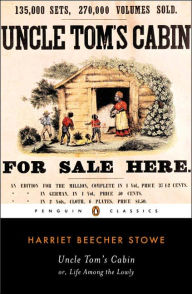
Trying to review a work of historic importance is challenging because it doesn’t call for the same kind of response a contemporary work does. Uncle Tom's Cabin was published in 1852, at a time when debates about abolition were raging across America. It’s an important book because it represents the work of America’s first major woman novelist, Harriet Beecher Stowe.
But it’s also important because of its purpose and impact. It was a clear plea to northern states to fight actively in the cause of abolition, and even an appeal to southern slave owners’ humanity. Abraham Lincoln even claimed the novel hastened the beginning of the Civil War. It was a massively popular book at the time, selling more than 300,000 copies in the first year.
As a novel, however, it’s a bit frustrating to read because it jumps around from character to character frequently, and much of the book alternates between story and sermon. The preachy tone of so much of the second half of the novel is over the top, but given Stowe’s purpose, it’s perhaps understandable.
Early in the novel, her subdued sarcasm reminds me of Twain and even Jane Austen, but over the course of the work, this subtlety disappears and we get a full-on polemic. And not surprisingly, the book is populated by devils and angels, and not much in between. At times, unfortunately, despite Stowe’s obvious position against slavery, the narrative is still cringe-worthy with her own condescension and generalizations about Africans.
Nevertheless, given the book’s place in American history and American literature, I’m glad I finally read it, even if it’s not one I’d return to. Over the past year I’ve read quite a few novels where slavery in America played a large part, so it was a logical time to read this, but frankly, I’d have been fine reading Morrison, Gyasi, and Whitehead and giving this one a pass.
A note on the text: I don’t know if the Penguin Classics edition was trying to recreate the text of an earlier edition, or if they just didn’t bother to proofread the text, but the book has an appalling number of typos, sometimes several on a single page. And the font is just ugly. If you’re planning to read it, I’d look for another edition.
But it’s also important because of its purpose and impact. It was a clear plea to northern states to fight actively in the cause of abolition, and even an appeal to southern slave owners’ humanity. Abraham Lincoln even claimed the novel hastened the beginning of the Civil War. It was a massively popular book at the time, selling more than 300,000 copies in the first year.
As a novel, however, it’s a bit frustrating to read because it jumps around from character to character frequently, and much of the book alternates between story and sermon. The preachy tone of so much of the second half of the novel is over the top, but given Stowe’s purpose, it’s perhaps understandable.
Early in the novel, her subdued sarcasm reminds me of Twain and even Jane Austen, but over the course of the work, this subtlety disappears and we get a full-on polemic. And not surprisingly, the book is populated by devils and angels, and not much in between. At times, unfortunately, despite Stowe’s obvious position against slavery, the narrative is still cringe-worthy with her own condescension and generalizations about Africans.
Nevertheless, given the book’s place in American history and American literature, I’m glad I finally read it, even if it’s not one I’d return to. Over the past year I’ve read quite a few novels where slavery in America played a large part, so it was a logical time to read this, but frankly, I’d have been fine reading Morrison, Gyasi, and Whitehead and giving this one a pass.
A note on the text: I don’t know if the Penguin Classics edition was trying to recreate the text of an earlier edition, or if they just didn’t bother to proofread the text, but the book has an appalling number of typos, sometimes several on a single page. And the font is just ugly. If you’re planning to read it, I’d look for another edition.
 RSS Feed
RSS Feed
